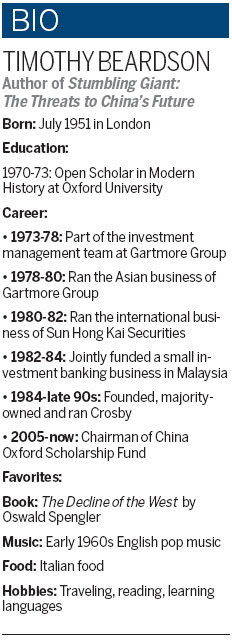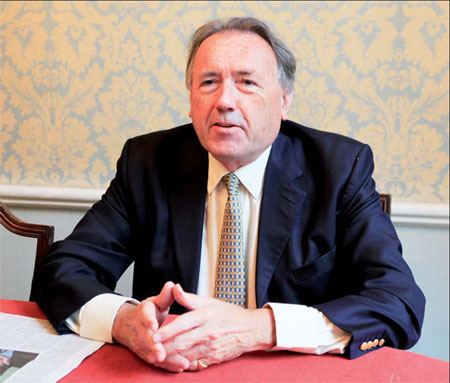Step on the reform pedal
Updated: 2013-07-05 09:51
By Cecily Liu (China Daily)
|
|||||||||||
|
Timothy Beardson says China should develop its own innovation rather than depend on knowledge transfer from multinationals. Susanna Ma / for China Daily |

China must press ahead to spur innovation to avoid the mid-income trap, says financial expert
Demographic shifts will be the biggest impediment for sustained economic growth in China in the coming decades, says Timothy Beardson, the financial expert and author.
The 62-year-old entrepreneur and founder of what was then the largest independent investment bank in Asia argues that rather than dilly-dallying, China should press ahead with more radical economic reforms so that it does not fall into the mid-income trap when its declining workforce slows economic growth.
Beardson, author of Stumbling Giant: The Threats to China's Future, says China's demographic trends indicate higher wages, ageing and a declining population and gender imbalance, and these factors combined put China at the risk of a mid-income trap.
"I think it's fair to say that no society in history has had a falling population and been able to sustain a high level of growth.
"My thinking is China needs to make the changes it can make, preferably as early as possible, so that it can continue to enjoy sustained growth rates, while there is still money to achieve it."
The first requisite for this is for the government to introduce more policies to spur the knowledge economy, as it would help China deviate from its export-oriented growth model when its abundance of low-skilled labor shrinks.
In his book, Beardson says that China must make the transition to an innovation-driven economy, that produces products branded in China, instead of just being a manufacturer for foreign companies.
He argues that though China is engaged in "higher sciences" like space exploration and cyber technology, it still lacks creativity in commercial sectors, and in particular private sectors.
"Currently, 80 percent of the high tech products in China are made by foreign multinationals in China, rather than by Chinese companies," Beardson says.
Beardson says these are not made-up figures, but statistics given by Zhao Jinping, a researcher at the Development Research Center of the State Council, during an interview with Xinhua News Agency in 2010.
Such statistics are worrisome for China, Beardson says, adding that since multinationals will ensure that their technologies are protected from Chinese competitors and sub-contractors, there will be no technology transfer.
Citing the example of camera maker Kodak, he says the company invested six times as much in its wholly owned business in China as in all its various joint ventures combined. The joint ventures were required to produce basic film, while its subsidiary made the most technically sophisticated film, but without any technology transfer.
To further demonstrate the disparity between creating and making high-tech products, he cites Asian Development Bank figures showing that China only makes $6.50 (5.02 euros) by assembling an iPhone, which is sold in the US for $179.
"(Multinationals) bring all the high-tech components into China, in a cardboard box wrapped in cellophane. No one will call it (the assembling) high-tech work, because the real high-tech is brought into China and assembled there."
China should develop its own innovation rather than depend on knowledge transfer from foreign multinationals, he says. An important issue confronting China, Beardson says, is that much of the country's research and development is funded by the state sector on a "non-commercial basis" rather than by the private sector.
Beardson says one innovation path that China could follow is of buying intellectual properties for new technologies developed abroad and then use them to create better products, which is the path that made Japan innovative in the 19th century.
"In post-1945 Japan, companies were often buying patents and ideas from Germany, America and Britain. Often they were licensing the ideas, and bringing the goods to the marketplace before the British, German and Americans could. They could work out what was needed in the market and what products the technology could be used for, " Beardson says.
Japan's computer, automotive and manufacturing industries all benefited from this method, and China could consider the same approach so that its economy can be "innovative" without being "inventive", he says.
Beardson also feels that China should revamp its educational system. Concerns over China's rigid system of national college entrance examinations, or gaokao, has stifled creativity, he says.
"The gaokao should allow more answers. Sometimes one question can have a million right answers, and it depends on how well it's argued, and what research is brought to bear. It doesn't matter what (the students) say, but the point is that they thought about it and argued well," Beardson says.
China is also suffering from having too many university graduates, meaning there is a mismatch between their skills and the more technical skills needed for spurring the economy.
One example is customer services skills, and another is branding skills, both of which can be gained from vocational education, he says.
"If you close down half of China's universities and reinvest the money in the remaining 50 percent, you can have better teaching and better results."
After graduating from Oxford University in 1973, Beardson joined Gartmore Group, a UK-based investment management business, which sent him to Hong Kong to run the company's Asian business in 1978.
Beardson has since then lived in Hong Kong, and in 1984 he founded the investment bank Crosby, which at its peak employed 650 workers in 14 countries and had annual transaction volumes in excess of $20 billion.
Crosby became the first foreign investment bank to receive a license to operate at the Chinese mainland, as well as the only foreign institution to join the working group involved in setting up the Shanghai Stock Exchange.
Crosby helped many Chinese companies with stock exchange listings and convertible bond issues. It also helped many Western institutions to invest in China.
Realizing that the profit margin of Asian financial services companies was fast diminishing, Beardson sold Crosby in the late 1990s. Since then, he has been engaged in a range of activities, including chairing the China Oxford Scholarship Fund, which funds postgraduate studies of talented Chinese graduates from disadvantaged families.
Looking back, Beardson says, China was one of the fastest reforming countries in the world when he first went there to do business, but the speed of reform has slowed since 2000 and he fears that time will run out for China to change the course of its economic development.
His book suggests many reform measures, including increasing bank lending to the private sector to spur growth, improving welfare provisions to enhance social stability, cleaning up environmental pollution to secure sustainable growth, and engendering an academic and commercial environment that encourages critical thinking to create a true knowledge economy.
He says China has tight deadlines to deal with these concerns, because its demographic shift will slow growth down by 2030, when China's over-65s are projected to triple to more than 300 million.
"The budgetary impact of that is huge. It may come down to quite simple decisions for China, like 'Can you have aircraft carriers and old people's homes'?"
He says alongside the ageing population challenge is the projection that India's population could overtake China's by 2020, which means China will start to lose its attractiveness as a popular location for foreign investment, and this loss of capital flow could further slow the country's growth.
"China cannot waste any more time, and should have the courage to undertake more reforms. China's leaders will have to be bold enough to take these steps."
cecily.liu@chinadaily.com.cn
(China Daily European 07/05/2013 page32)
Today's Top News
List of approved GM food clarified
ID checks for express deliveries in Guangdong
Govt to expand elderly care
University asks freshmen to sign suicide disclaimer
Tibet gears up for new climbing season
Media asked to promote Sino-Indian ties
Shots fired at Washington Navy Yard
Minimum growth rate set at 7%
Hot Topics
Lunar probe , China growth forecasts, Emission rules get tougher, China seen through 'colored lens', International board,
Editor's Picks

|

|

|

|

|

|






